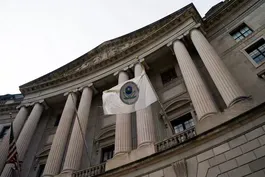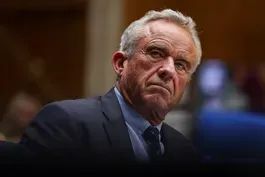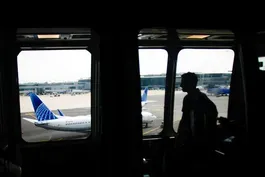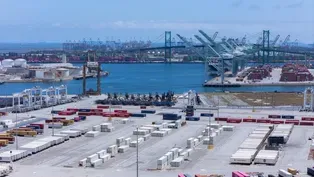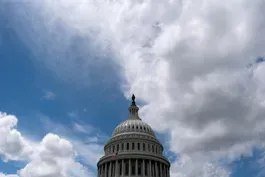
How Trump's meeting with Syria's leader is a turning point
Clip: 5/14/2025 | 10m 26sVideo has Closed Captions
How Trump's meeting with Syria's new leader is a turning point for the war-torn nation
Day two of President Trump's tour of the Mideast brought with it the prospect of a new future for Syria. The president announced plans to lift sanctions on Syria following the fall of the Assad regime. Trump also met with Syria's interim president, a former jihadist who until recently had a $10 million U.S. bounty. Geoff Bennett discussed more with Mouaz Mustafa of the Syrian Emergency Task Force.
Problems with Closed Captions? Closed Captioning Feedback
Problems with Closed Captions? Closed Captioning Feedback
Major corporate funding for the PBS News Hour is provided by BDO, BNSF, Consumer Cellular, American Cruise Lines, and Raymond James. Funding for the PBS NewsHour Weekend is provided by...

How Trump's meeting with Syria's leader is a turning point
Clip: 5/14/2025 | 10m 26sVideo has Closed Captions
Day two of President Trump's tour of the Mideast brought with it the prospect of a new future for Syria. The president announced plans to lift sanctions on Syria following the fall of the Assad regime. Trump also met with Syria's interim president, a former jihadist who until recently had a $10 million U.S. bounty. Geoff Bennett discussed more with Mouaz Mustafa of the Syrian Emergency Task Force.
Problems with Closed Captions? Closed Captioning Feedback
How to Watch PBS News Hour
PBS News Hour is available to stream on pbs.org and the free PBS App, available on iPhone, Apple TV, Android TV, Android smartphones, Amazon Fire TV, Amazon Fire Tablet, Roku, Samsung Smart TV, and Vizio.
Providing Support for PBS.org
Learn Moreabout PBS online sponsorshipGEOFF BENNETT: Welcome to the "News Hour."
Day two of President Trump's tour of the Middle East brought with it the prospect of a new future for Syria.
Today, in Saudi Arabia, a landmark meeting, an American president and a one-time insurgent leader the U.S. once hunted.
President Trump was all smiles as he greeted Syrian interim President Ahmed al-Sharaa, who has traded his fatigues for tailored suits, and, with it, another step for Syria to cement its resurgence and acceptance on the world stage.
DONALD TRUMP, President of the United States: We are currently exploring normalizing relations with Syria's new government, as you know.
I am also ordering the cessation of sanctions against Syria to give them a fresh start.
It gives them a chance for greatness.
GEOFF BENNETT: The U.S. first sanctioned Syria in 1979, designating it a state sponsor of terrorism.
In 2011, it began imposing a series of additional sanctions after the former Assad regime launched a brutal crackdown of the popular uprising.
The sanctions targeted not only the Assad government, but insurgent groups in Syria that fought Assad, including a group known as HTS, which al-Sharaa ran for years.
Al-Sharaa himself was listed as a terrorist by the U.S. and 20 years ago today was arrested and imprisoned by U.S. forces in Iraq.
MATTHEW LEVITT, Washington Institute for Near East Policy: The Israelis have some real security concerns when it comes to the new regime in Syria.
This is a regime that grew out of a group that was affiliated with al-Qaida and Islamic State.
GEOFF BENNETT: Matthew Levitt directs the Counterterrorism Program at the Washington Institute for Near East Policy.
MATTHEW LEVITT: They're concerned that Syria could become a base for Hamas or other Palestinian terrorist groups again.
They're concerned that HTS, which dominates this new interim government, doesn't have control over all of Syria's territory.
GEOFF BENNETT: But Mr. Trump today pushed for Syria to establish diplomatic relations with Israel and join the Abraham Accords, the 2020 agreement which normalized diplomatic relations between Israel and Morocco, Bahrain, Sudan and the United Arab Emirates.
DONALD TRUMP: We will continue that progress by adding more countries to the Abraham Accords.
We have the four, and we're going to have -- they're going to be -- I think they're going to be filling up very rapidly.
GEOFF BENNETT: But relations between Syria and Israel have historically been fraught and violent, with Israel continuing to bomb what it calls terrorist targets, weapons depots, air bases and military installations across Syria.
Removing foreign fighters is another one of the Trump administration's demands, one of many challenges now facing Syria's new leader as the West scrutinizes his resolve.
MATTHEW LEVITT: The way to do this is not to summarily terminate all these sanctions, but to make sure that they are suspended in ways that are real and clear so people feel comfortable doing business with and through Syria.
GEOFF BENNETT: Levitt says U.S. sanctions need to be adjusted to give the new Syrian regime a chance to prove that it's not a threat to the U.S. or Israel.
MATTHEW LEVITT: This is a government led by someone who came out of al-Qaida.
And it's very difficult to get past that.
And yet, because he has demonstrated, he and his government, some good actions on things that have mattered to us, there's reason to go out on a limb and try and work with this government.
GEOFF BENNETT: But, in Syria tonight, celebration, a sense of joy and hope for the future, emotions long buried by years of despair.
And for more insight, we're joined now by Mouaz Moustafa, executive director of the Syrian Emergency Task Force.
It's a U.S.-based nonprofit that supports democracy in Syria.
Thanks for being here.
MOUAZ MOUSTAFA, Executive Director, Syrian Emergency Task Force: Thanks for having me.
GEOFF BENNETT: And we should say that you have met recently with al-Sharaa and you have also been advocating for the lifting of sanctions following the fall of Assad.
We see that picture there, you meeting him alongside a U.S. delegation.
President Trump said he made this decision after talking with the Saudi crown prince and with Turkey's president.
What was the convincing argument?
MOUAZ MOUSTAFA: Well there are so many.
I mean, what if we don't lift the sanctions on Syria?
What if we leave the sanctions on Syria?
Mind you, these are sanctions that was placed on Syria specifically on the Assad regime because he was killing his people, and it was in support of the people that were rising up against this tyrant.
But when the Assad regime was gone, the sanctions remained.
Now, if these were sanctions were on the Assad regime, not on the Syrian people, they should go right away, no preconditions.
And the fact that they remain, it begs the question, were they always sanctions against the Syrian people and not this tyrant?
The other thing is, if somebody had come to the U.S. and said, look, we will beat and defeat Iran, ISIS, Russia and the Assad regime in Syria in exchange for the lifting of sanctions, the answer would have been absolutely yes.
Well, that's exactly what happened there.
If we don't lift the sanctions, Syria would become a failed state.
Financially, it had weeks to go.
And that means ISIS, Iran, Russia, Hezbollah is back.
So we should ask ourselves what happens if we don't lift the sanctions.
That would be a disaster for the region and the world.
GEOFF BENNETT: I want to revisit some of these photos we saw today of President Trump and MBS and al-Sharaa.
It's remarkable.
There's the photo right there.
It's remarkable when you consider that, until six months ago, al-Sharaa had a $10 million U.S. bounty on his head.
Fast-forward to the current moment.
President Trump told reporters, said, he's a young attractive guy, he's a tough guy with a strong past, but he said that he thought that he had the opportunity to really stabilize Syria.
Is that a well-informed and realistic view of his leadership potential and his resolve?
MOUAZ MOUSTAFA: I was in Syria about a couple of weeks ago or a week-and-a-half ago, and with this delegation that included the Syrian Jewish community, coming back for the first time in 34 years wanting to rebuild the oldest synagogue in the world destroyed by Assad.
Now we can rebuild that because the sanctions are gone, American young lady named Maryam Kamalmaz that was seeking more information her dad and other Americans that were disappeared under Assad, seeking also a conversation with the Syrian government, and myself.
And during that meeting, which was supposed to be 50 minutes, it went on for 3.5 hours.
In that meeting, we discussed so many things and it wasn't just my opinion, but the opinion of everybody else in that delegation in the picture that you saw, that this is the right man.
Number one, this is a changed man.
This is somebody who wants to see Syria be at peace with all of its neighbors and to never go into war for the next thousand years.
And this is a person who has promised working diligently towards elections, which would make Syria the first democratic election maybe in the Arab world, which is amazing on its own.
We knew after that 3.5-hour meeting that if President Sharaa was to meet with President Trump, that they were just going to hit it off.
There were so many mutual interests in terms of what both presidents wanted to see happen in the Middle East.
And, number two, they're both strong, transformational leaders in their own sort of ways and that they would get along.
I think that's exactly what we have seen happen.
And I think that was a historic decision and the right one in terms of lifting sanctions on Syria.
GEOFF BENNETT: And yet, as you well know, there is concern, there is criticism in some quarters, as you heard in the piece, this idea that you can't lose sight of the fact that this is a government led by someone who came out of al-Qaida.
To your point, he severed ties with al-Qaida back in 2016.
Our Nick Schifrin reports that Israel had no advance notice of the lifting of these sanctions and that they are not happy.
Israel has deep suspicion of this administration.
Is any of that concern warranted?
MOUAZ MOUSTAFA: No, the concern was warranted when Bibi Netanyahu's government was arbitrarily bombing Syria after it had just come out of a horrific war, while the Israeli government, before ever meeting the new Syrian government, calling them all blank terrorists, keep the designations, keep the sanctions.
The concern should have come from the efforts here in the United States to shield President Trump from what opportunity lies in Syria.
What is in the best interests of Israel as a state is different what is in the best interests of an Israeli politician, that war ongoing keeps them in office and maybe out of the courtroom.
But what President Trump has done is something that is a service to the United States' interests and, frankly, interests of everyone in the region, including Israel.
As we were meeting with President Sharaa, he was telling us about the reports of these massive Iranian-backed militias numbers that were alongside regime troops on the Iraqi side of the Syrian border, that that was a real problem.
When we came back here just last week, I met with the National Security Council before President Trump went to Saudi Arabia.
And I mentioned that this was a real concern.
And the National Security Council official that I was meeting with said, I have seen the intelligence reports.
It is.
That's the concern for Israel's long-term security, having Hezbollah and IRGC in Iran and ISIS on its borders.
And, finally, I have to say, right now, and this goes underreported, the new Syrian government, led by President Sharaa, worked directly with the U.S. military on counter-ISIS operations and counter-al-Qaida operations.
It is just ironic that we're saying this is not a changed man, this is really ISIS with another hat on, when he's ISIS' worst enemy in Syria and vice versa.
GEOFF BENNETT: As we wrap up this conversation, I don't want to lose sight of what this means for ordinary Syrians.
Syria has been starved of international investment due to these sanctions.
Now that they are being lifted, what might this mean?
MOUAZ MOUSTAFA: Oh, it is just sort of untold potential.
The Syrian people are the most resilient people I have ever seen.
They are so smart.
They're so willing to work.
They don't want handouts.
And they want to see their country become a democracy.
I think what we see in Syria is now opportunity for Syria to be a ray of hope for the entire region.
And I think a stable, prosperous, democratic Syria, I think makes the whole world a better place.
And the Syrians, you can feel their happiness.
And we have to say there's a thank you to President Trump for giving Syria this chance, a chance to be a democracy.
GEOFF BENNETT: Mouaz Moustafa, a pleasure to speak with you.
Thanks for being here.
MOUAZ MOUSTAFA: Thanks for having me.
EPA rolls back limits on forever chemicals in drinking water
Video has Closed Captions
Clip: 5/14/2025 | 4m 8s | EPA rolls back Biden-era rules against 'forever chemicals' in drinking water (4m 8s)
How RFK Jr. is shaping the conversation about autism
Video has Closed Captions
Clip: 5/14/2025 | 12m 25s | How RFK Jr. is shaping the conversation about autism and why advocates are pushing back (12m 25s)
News Wrap: Duffy blames aviation problems on neglect
Video has Closed Captions
Clip: 5/14/2025 | 6m 41s | News Wrap: Duffy blames aviation problems on previous administration and years of neglect (6m 41s)
Port of LA head describes how tariffs are affecting imports
Video has Closed Captions
Clip: 5/14/2025 | 5m 53s | Port of LA head describes how Trump's tariffs are affecting imports (5m 53s)
'The Director' explores an artist in a time of trauma
Video has Closed Captions
Clip: 5/14/2025 | 6m 45s | New novel 'The Director' explores an artist's responsibilities in a time of trauma (6m 45s)
What's in the first draft of the GOP's 'big, beautiful bill'
Video has Closed Captions
Clip: 5/14/2025 | 5m 29s | What's in the first draft of the GOP's 'big, beautiful bill' cutting taxes and spending (5m 29s)
Providing Support for PBS.org
Learn Moreabout PBS online sponsorshipSupport for PBS provided by:
Major corporate funding for the PBS News Hour is provided by BDO, BNSF, Consumer Cellular, American Cruise Lines, and Raymond James. Funding for the PBS NewsHour Weekend is provided by...
